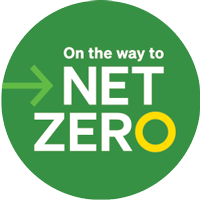Making responsibility the benchmark.
Sustainability is not a trend for us – it is a mindset. We take responsibility for our customers, ourselves, and future generations. With a clear strategy and innovative solutions, we support our customers in achieving their own sustainability goals. Because we share a vision: shaping a climate-friendly future – together, as strong partners.
Less is not enough.
Net Zero by 2040.

We have set an ambitious goal: By 2040, we will achieve net zero emissions while actively contributing to the transformation of the construction industry. We are convinced that it is crucial to lead by example: By the end of 2024, we were the first formwork and scaffolding company worldwide to commit to the Science Based Targets initiative (SBTi), and we will have our targets scientifically validated within the next 24 months. With defined steps and a consistent strategy, we are navigating our path toward a zero-emission future.
2030


2040
.png)

1 Scope 1: Direct emissions from our company, e.g., during production.
Scope 2: Emissions from purchased energy, e.g., electricity for offices.
Scope 3: Emissions across the value chain, e.g., employee mobility, waste management, purchased goods.
2 90% reduction of emissions, 10% will be neutralized.
3 These targets have not yet been validated by the SBTi but represent the minimum requirements set by the SBTi for the absolute reduction pathway aligned with the 1.5°C goal.

Our path to Net Zero
Approximately 37% of global greenhouse gas emissions result from the construction and operation of buildings.4 For this reason, our company focuses on actions that stem from our core business and have the greatest potential for impact, innovative technologies, and future-proofed materials that radically reduce greenhouse gas emissions and drive the circular economy.
4 Global Status Report for Buildings and Construction, 2024

Decarbonization
By using resource-efficient materials, energy-efficient processes, and climate-friendly solutions, we are systematically reducing our greenhouse gas emissions.

Circular Economy
Our goal is to keep materials in circulation for as long as possible. We develop durable products and promote reuse, repair, and recycling.
Knowledge creates change.
Product Carbon Footprint
To effectively reduce emissions, we must first gain a clear understanding of them. This requires identifying the greenhouse gas emissions our products generate throughout their lifecycle. Doka is setting new standards for more climate-friendly product design by calculating the Product Carbon Footprint (PCF) for over 7,000 products and providing customers with independently authenticated data to make informed decisions.

Reconsidering resources throughout their entire lifecycle.
We design our products to last – even under the toughest jobsite conditions. Through our expertise in professional refurbishment and repair, we extend their lifespan and reduce the need for new resources. We are already taking first steps to reintegrate recycled materials into our products' life cycle and continue to expand this approach. Our rental model also enables customers to use formwork and scaffolding as needed instead of purchasing them. This saves additional materials, reduces waste, and makes construction more efficient – all of which are important contributions to our goal: Net Zero by 2040.
From planning to completion
Solutions for sustainable construction sites
We support construction companies in driving decarbonization on site. With climate-friendly products, smart solutions, and optimized processes, we help our clients use materials in a resource-saving way, reduce emissions, and make the construction process more efficient.
Here is a selection of our products that help implement construction projects with a focus on climate and resource efficiency:

Taking the right steps
Discover how we are actively driving our net-zero goal forward — step by step — with a set of first actions.
Change starts with us!
Sustainability is not just one of many topics for us – it is a fundamental responsibility. That’s why our dedicated Sustainability Management team focuses on consistently advancing our climate goals.



Strength in collaboration
We develop our sustainability strategy in partnership with Umdasch Group AG and our sister companies, umdasch The Store Makers and umdasch Industrial Solutions. All initiatives and projects are documented in our joint annual report.

Concrete actions. Measurable results.
As a sign of our long-term commitment, we rely on certified standards in our products and processes. This ensures that our customers can count on us as a trusted partner in achieving their climate goals.
Contact form
Sustainability thrives on dialogue. Share your questions or goals with us – we are here to actively support your journey toward greater sustainability.



















